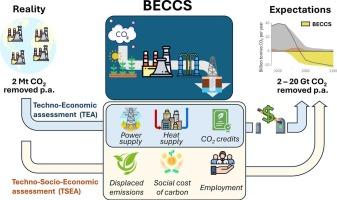通过技术-社会经济评估将社会效益货币化,解锁BECCS的可行性
IF 9.6
1区 环境科学与生态学
Q1 ENVIRONMENTAL STUDIES
引用次数: 0
摘要
生物能源与碳捕获和储存(BECCS)被认为是通过同时提供净负排放和可用能源来实现净零排放目标的关键技术。然而,由于其投资吸引力较差,大规模部署仍然有限。传统的技术经济评估(TEA),即使考虑到碳信用收入,也表明BECCS系统在财务上与传统或可再生能源没有竞争力。本研究引入了一个技术-社会经济评估(TSEA)框架,该框架通过碳的社会成本(SC)和劳动力的机会成本将其货币化,从而整合了被忽视的社会效益,如间接排放取代和创造就业机会。一个案例研究评估了一个以小麦秸秆为燃料的热电联产BECCS设施,该设施在三种策略下运行:电和热热电联产、碳信用最大化和电力最大化。传统TEA的结果显示盈利能力为负(NPV = - 4.6亿美元),并表明碳信用价格必须超过240美元/tCO₂,才能使电力成本达到与可再生能源相当的水平。在TSEA框架下,所有配置都是有利可图的,电力最大化模式的净现值达到22.8亿美元。敏感性分析强调了盈利能力对假定碳社会成本的强烈依赖,凸显了BECCS经济学的不确定性和政策敏感性。这些发现强调了认识到BECCS的全部社会价值并将其货币化的必要性。未来的政策必须确定谁来承担碳排放损失的成本,并且必须建立机制,确保利益相关者能够为BECCS带来的更广泛的社会效益获得公平的补偿,从而促进投资并使这项关键技术能够在现实世界中得到应用。本文章由计算机程序翻译,如有差异,请以英文原文为准。

Unlocking BECCS viability through monetizing societal benefits by techno-socio-economic assessment
Bioenergy with carbon capture and storage (BECCS) is considered a key technology for achieving the net-zero emissions target by simultaneously delivering net-negative emissions and usable energy. However, large-scale deployment remains limited due to its poor investment attractiveness. Traditional Techno-Economic Assessments (TEA), even when accounting for carbon credits revenue, show that BECCS systems are not financially competitive with conventional or renewable energy sources. This study introduces a Techno-Socio-Economic Assessment (TSEA) framework that integrates overlooked societal benefits, such as indirect emission displacement and job creation, by monetising them through the social cost of carbon (SC) and the opportunity cost of labour. A case study evaluates a wheat-straw-fuelled combined heat and power BECCS facility operating under three strategies: electricity and heat cogeneration, carbon credit maximization, and electricity maximization. Conventional TEA results show negative profitability (NPV = −$460 million) and reveal that carbon credit prices must exceed $240/tCO₂ for the levelized cost of electricity to reach parity with renewable energies. Under the TSEA framework, all configurations become profitable with the electricity-maximizing mode reaching an NPV of $2.28 billion. Sensitivity analysis highlights profitability's strong dependence on the assumed social cost of carbon, underscoring the uncertainty and policy sensitivity of BECCS economics. These findings underscore the need to recognize and monetise BECCS's full societal value. Future policies must determine who bears the cost of carbon damages and must establish mechanisms to ensure stakeholders are fairly compensated for the broader social benefits delivered by BECCS, thus fostering investment and enabling real-world deployment of this essential technology.
求助全文
通过发布文献求助,成功后即可免费获取论文全文。
去求助
来源期刊

Sustainable Production and Consumption
Environmental Science-Environmental Engineering
CiteScore
17.40
自引率
7.40%
发文量
389
审稿时长
13 days
期刊介绍:
Sustainable production and consumption refers to the production and utilization of goods and services in a way that benefits society, is economically viable, and has minimal environmental impact throughout its entire lifespan. Our journal is dedicated to publishing top-notch interdisciplinary research and practical studies in this emerging field. We take a distinctive approach by examining the interplay between technology, consumption patterns, and policy to identify sustainable solutions for both production and consumption systems.
 求助内容:
求助内容: 应助结果提醒方式:
应助结果提醒方式:


